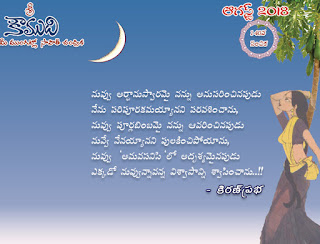The
controversy began when Arun allegedly received a phone call from Ramanathan
Seetharaman, demanding that he refrain from taking part in the concert.
Published:
27th August 2018 04:01 AM | Last Updated: 27th August
2018 04:01 AM
File
photo|AP
By Samuel Merigala | Express News Service
CHENNAI:Despite
threats from Hindu fundamentalist groups, ‘Yesuvin Sangama Sangeetham’, a
concert envisioned by renowned Carnatic artist T Samuel Joseph (Shyaam) went on
as planned in the city on Saturday. Singer Kalpana Raghavendar filled in for OS
Arun, who backed out following threats and criticism from fundamental groups,
who alleged he was being used to spread Christianity.
The
controversy began when Arun allegedly received a phone call from Ramanathan
Seetharaman, founder of a Hindu fundamentalist group on August 6, demanding that
he refrain from taking part in the concert. Ramanathan also targeted Magsaysay
award winner T M Krishna and singer Nithyasree Mahadevan. Ramanathan confirmed
to The Wire that it was indeed his voice.While Krishna has come out strongly
against the attempt to make Carnatic music exclusive to one religion, Arun and
Nithyasree seemed to have succumbed to the threats. Nithyasree even offered an
apology through an FB post ‘for inadvertently hurting your sentiments if any’.
According
to Paul Wilson, Head of the Department of Chemistry in a private college near
the city and his wife Jasmine Wilson, who has an MFA in Indian Music from the
Tamil University in Thanjavur, these threats stem from the false notion that
Carnatic music has no Christian heritage. “We were very disturbed after the
controversy and decided to do some research,” said Paul, also a musician.One of
the most obvious yet unspoken contributions of Christianity to Carnatic music
is the violin. This stringed instrument, which is an integral part of any
Carnatic concert today entered the fray through Christian proponents.
Vedanayagam
Sastriar, a Christian, who is known to have composed hundreds of Carnatic
keerthanas, learnt to play the instrument as a 12-year-old from German
missionary Friedrich Schwarz in 1786. He went to pass on the art to Vadivelu
Pillai, who became the ‘Asthana Vidwan’ in the court of renowned Carnatic
composer Raja Svati Tirunal of Travancore.
Baluswamy
Dikshitar, brother of Muthuswamy Dikshitar, one of the Carnatic trinity, is known
to have been the first person to infuse the violin into Carnatic compositions
using the ‘Sa Pa Sa Pa’ string tuning which is still followed today.But like
Vedanayagam Sastriar, Baluswamy Dikshitar also learnt the violin from European
Christians. “He is said to have learnt to play the violin from a band in Fort
St. George,” said Paul, explaining the role that Baluswamy’s patron, Manali
Muthukrishna Mudaliar, played in arranging the interaction with the East India
Company.
In
addition, Christian artists have also helped preserve the music with
notation.Chinnaswami Mudaliar, a Christian, brought out Oriental Music in Staff
Notation in 1870. This was the first large-scale attempt to record tunes of
Carnatic music, which had till then been passed down through oral traditions.
“Tyagaraya owes his immortality to Mudaliar, He approached the
shishya-parampara of Tyagaraja like Walajahpet Krishnaswami Bhagavatar and
transcribed 800 pieces of Tyagaraja and other composers in Staff Notation,
checking his scripts with the help of violinists trained in Western music, who
were asked to play them by sight,” said Jasmine, explaining that Mudaliar was
also instrumental in ensuring the original compositions of Muthuswamy Dikshitar
were preserved.
The
contributions of Christian proponents also continued into the 19th and 20th
century. The contributions of Abraham Pandithar, a Siddha doctor from
Tirunelveli and his seminal work — Karunamirdha Sagaram, a 1346-page book
continues to be a reference material for research on Carnatic music.While
Samuel Joseph believes “Carnatic music is like the air. Free for everyone who
wants a breath”, Paul believes it “will only get more diverse by borrowing and
evolving”.
Source:
newindianexpress


